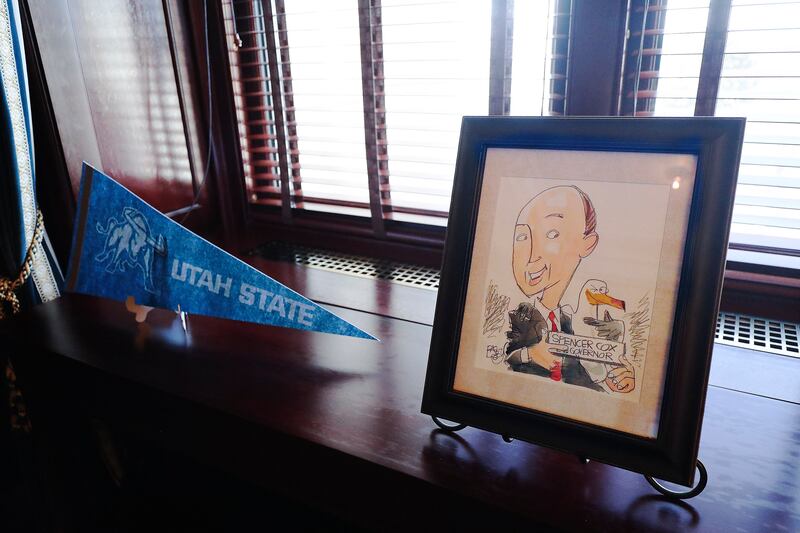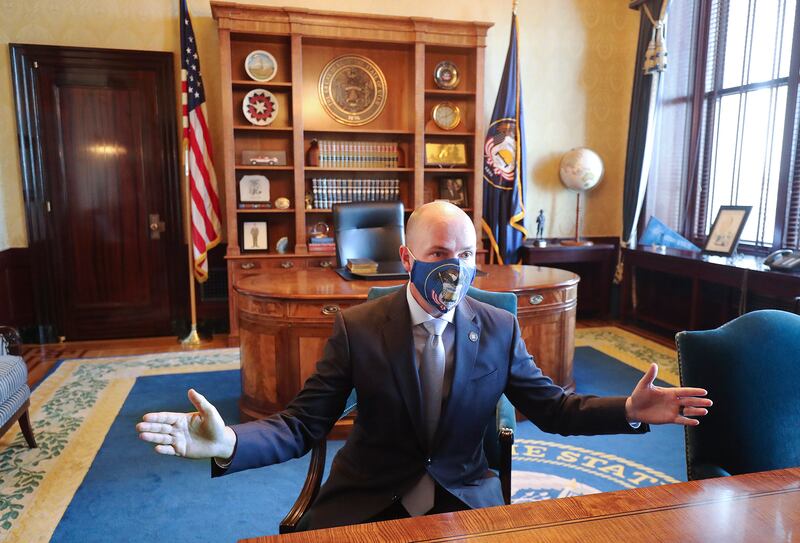SALT LAKE CITY — Gov. Spencer Cox was sworn in as Utah’s 18th governor Jan. 4, officially taking the reins of the state amid a time of crisis, with Utah’s COVID-19 death toll continuing to climb and case positivity rate now more than 30%.
On his first day of work Tuesday, we asked Cox to answer nine questions about his hopes for his first 100 days in office, how he will tackle the COVID-19 pandemic, whether he supports a statewide mask mandate and what steps he will take to address racial issues after a summer of social unrest.
Deseret News: What are your goals for your first 100 days?
Gov. Spencer Cox: We have so many, but maybe I can focus on just a couple. First and foremost is vaccine distribution rollout. I keep saying it. Tomorrow we’ll have everyone involved in the vaccine distribution here in our state coming together and focusing on what the roadblocks are and how to remove and eliminate those roadblocks. So that’s going to be huge.
Education funding during this legislative session is going to be critical. We want teaching to once again be a destination occupation. We want to make sure that we’re fairly compensating our teachers and that we’re eliminating the paperwork that isn’t making our kids any smarter.
And then you’ll see a big focus on rural economic development — rural infrastructure, making sure that our rural communities and really all of our low income communities have an opportunity to participate in the American dream.
So those are the three I would put at the top of the list.
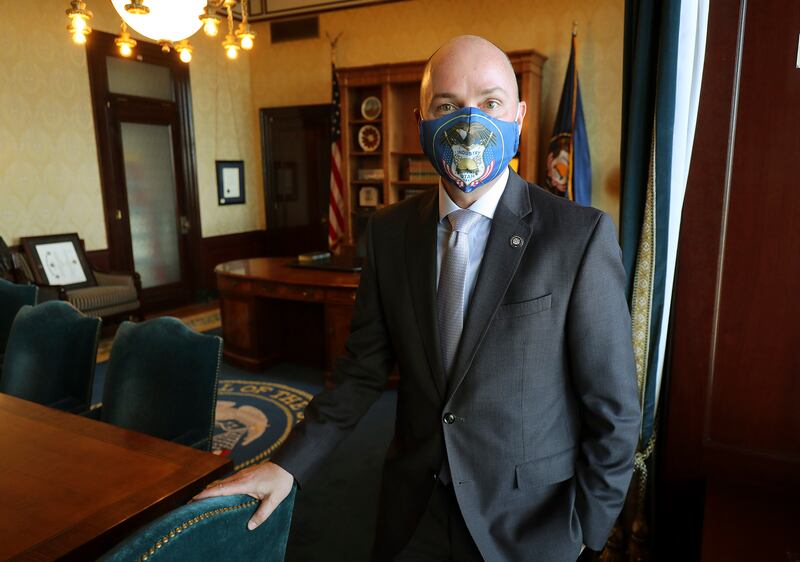
DN: You’ve talked about Utah needing to quicken the pace of its vaccination effort. What will you do as governor to improve that pace?
Cox: There will be things coming out during this week. So the goal is to have every dose of vaccine distributed in the week it’s received. If we can hit that pace, we’ll be just fine. And hopefully if we hit that pace, the federal government will give us even more vaccine if we’re able to prove that we’re using it quickly and efficiently. The way we do that, there’s two things. One, we have to make sure that all of our partners understand what they’re doing and that we have full transparency into what they’re doing. This can’t be something that just happens on weekdays from 8 a.m. until 5 p.m. This needs to be something that is happening every day that we’re meeting people where they are and getting the vaccine out as quickly as possible.
The other piece of this, though, is really simplifying who gets the vaccine. We’ve already done part of that — that was a big deal, changing from an industry specific vaccination process to an age specific vaccination process. Because every time you have to add in a determination of whether or not someone is qualified to get it, that slows down the process. Especially because, in many cases, people are signing up for a time so you don’t have hours and dayslong waits, and then they show up. If they’re not eligible when they show up, now you’ve just wasted that time slot and we slowed it down.
So this isn’t a health issue now. It really is — I’ve said this before — it’s an Amazon issue. It’s how do we get the package onto your doorstep in one day instead of five days. It’s how do we get this shot in your arm. It’s logistics and making sure that we’re well-coordinated.
DN: So what are the biggest road blocks, then, at this point?
Cox: We’ve seen some roadblocks in the hospitals. That’s where things slowed down the most, and some more than others. What we found, a couple things were happening. One, it’s a very different process when you go to the doctor’s office to get a vaccine versus kind of the mass vaccination events.
We also had, of course when we were focused just on the health care folks, they couldn’t all get it at the same time in case there were any adverse reactions. And so they were spreading it out and just, you know, it’s just their routine to kind of take it slow and do their thing. And that’s just not a pace that’s acceptable. The good news is they’ve changed that and we’ve seen many more vaccines. Intermountain Healthcare has really increased the number of vaccinations they’ve done over the past week. That’s been a big one.
Now what we’re seeing is, OK when do you move onto the next category? So if Davis County has already vaccinated all of their front-line health workers and first responders and long-term care facilities, can they now move on to teachers or do they have to wait for everyone else? I don’t want anyone waiting, so just clarifying that this is the list, start here, as soon as your done there, move onto the next one and let’s just keep this
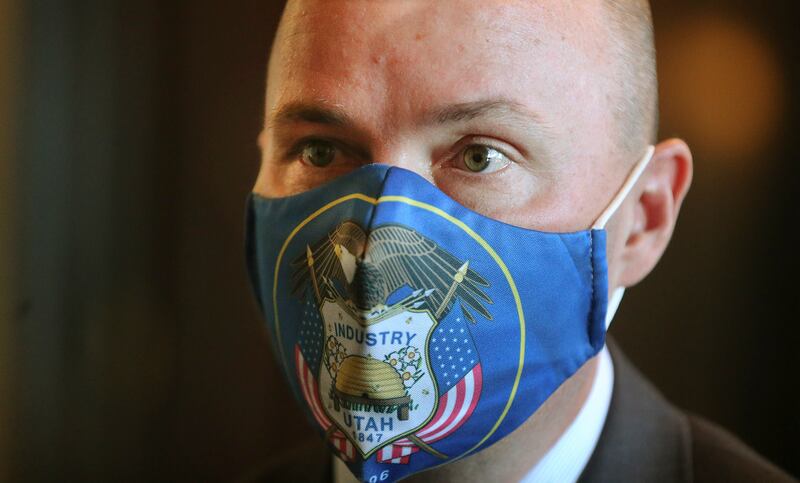
process rolling.
DN: Has politics — the conflict between politicians and medical advisers — clouded Utah’s COVID-19 response?
Cox: Certainly not on the vaccination side.
DN: What about early on?
Cox: Yeah, what I would say to that is, look. Gov. Herbert was really good at this, making sure all voices were at the table. And what I will say is in those discussions that have been very well publicized is the heath side won out almost every time. But that doesn’t mean you shouldn’t have those other voices and have those discussions. What I’m most excited about is really over the last two months, the economic side and the health side have come together. And they’re working hand in glove. They are working together. Their recommendations are coming united to us. They understand each other. And it’s been a really cool thing to see that happen.
The economic side is taking cues from the health side, the health side is understanding better how the decisions they make, how that impacts other people down the line — by the way, sometimes health related down the line not expected when people lose their jobs or out of school there are health implications as well to that. So what both sides are doing are taking a much more wholistic approach. I mean, it was the economic team that recommended a statewide mask mandate and it was the health care team that recommended changing some of the recommendations around restaurants and others and schools. So they’re really coming together and understanding there is a bigger picture to see.
DN: Again, early on I think we’ve seen that there wasn’t some matchup there, that they didn’t really coincide. You’re telling me today that’s better. Do you feel like that issue might have contributed to where Utah is now with COVID-19?
Cox: No, I don’t think it contributed to where we are now in any way. I think the best policy wins out when those discussions were happening. There were certainly distinct disagreement between those two sides, and we worked really hard to change that and make sure that that doesn’t happen going forward. The good policy won out in the end.
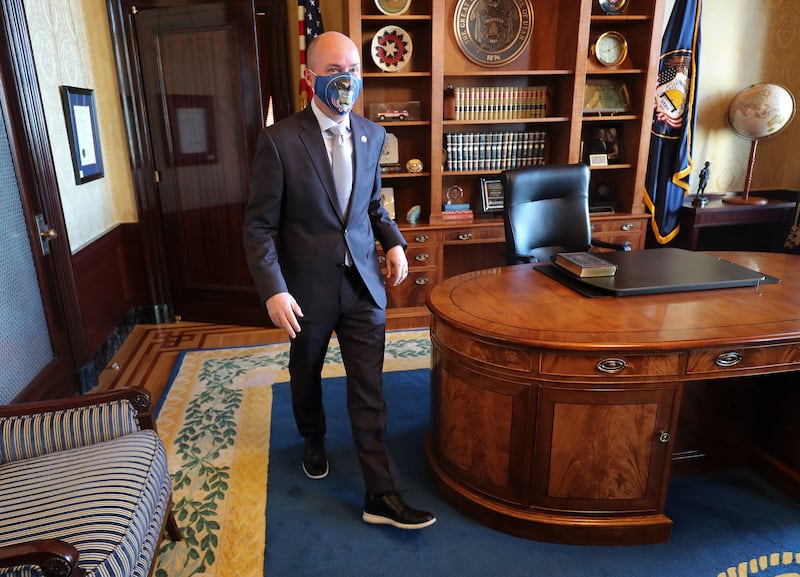
DN: Utah’s COVID-19 death toll is still climbing. The state’s positivity rate is now above 30%. And the spread of COVID-19 variant is prompting shutdowns in the United Kingdom. So what swift, additional actions will you take now as governor to bring the pandemic here under control?
Cox: Again, the vaccinations are the most important piece. But testing. Testing continues to be the bane of my existence (laughs). You mentioned the high positivity rate — and that’s something that is very concerning to us and to our public health professionals. This week we announced expanded testing for anyone that wants to do to get testing. To me, that is still the gold standard. That’s how we really change this.
Until we get the vaccine, we’re able to keep people in work, keep people in school. But testing. So fully implementing the test to play across the state. Fully implementing the test to stay in schools so that they can stay in and we’re getting the testing that they need. And we’re testing all of our higher education students within 10 days of going back to college so we can find those cases and isolate them before they spread. They were the real drivers of the spread back a few months ago.
So we’ve got to get better at the fundamentals. The fundamentals have not changed. Testing. Contact tracing. Vaccinations. Isolation if you test positive. That’s the key to all of this. And we’ve seen it can work. We had testing at the inauguration that the Department of Health used. There will be testing up here at Capitol Hill every day during the week so that the Legislature can do their work. Expanded testing really has the opportunity for us to keep the economy open.
DN: After you won the primary, you wouldn’t definitively answer in response to media questions whether you would enact a statewide mask mandate as governor. Now as governor, do you support the mask mandate, do you plan to keep it in place, and, if so, how do you keep its momentum and convince people — even those who protest mandates — that it’s important?
Cox: The answer to the first question is yes. I do support the statewide mask mandate and will keep it in place.
The last part of that is a little harder. I know there are people that will never believe anything we say. All we can do is share the data. Share what is happening out there and getting the best medical professional advice we can to people. The good news is our mask usage rate has continued to climb, north of 90% now for the state. And that’s had a real positive impact.
We’re hoping to arrest this post-Christmas surge very quickly. We did have a surge during Thanksgiving, but it was smaller than expected. We’re hoping that this one is smaller than expected as well and that we can keep numbers going down the other side.
DN: So you’re still not sure on how do you get these people who have been resistant from the beginning to wear masks?
Cox: Yeah, you don’t. And we will never be able to force people do everything that we ask them to do. That’s not going to happen. But what we can do is continue to convince people. And, again, more and more people are becoming convinced. That’s the good news. And we’ll just keep doing everything we can. But I fully recognize we’re not going to convince everyone.
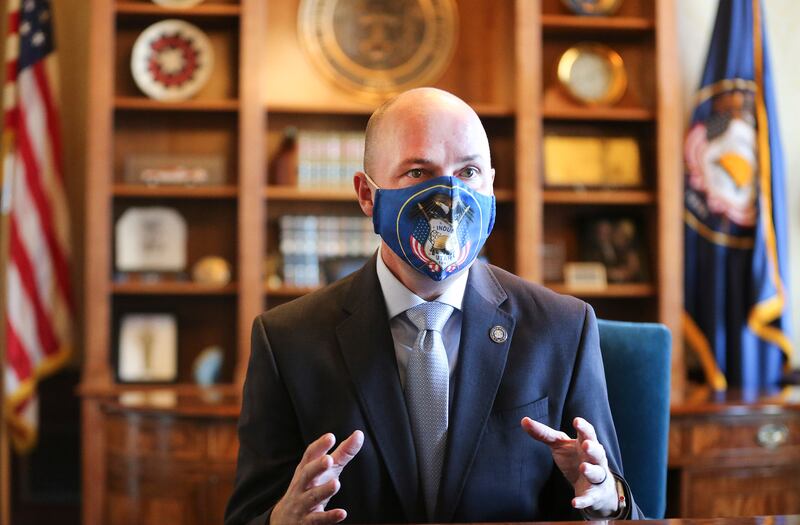
DN: Race relations rose to a head this summer with protests. Yesterday you signed on to the Utah Compact on Racial Equity, Diversity and Inclusion. What solid steps will you take as governor to execute the commitments in the compact and further real change for minority communities in Utah?
Cox: Yeah, there’s so many things that we’re working on in this space that I’m just really excited about. You asked for concrete examples. The first one is we now have a senior staff position dedicated just to that issue. That’s never happened here in the state of Utah. Nubia Peña (the director for the Utah Division of Multicultural Affairs), she’s fantastic. I work very closely with her with our Multicultural Commission and we’re elevating her role. I believe that state government can be a very good example to the rest of the state on how do to this the right way. And so she will be working very closely with us to make changes in the way we evaluate, the way we hire people, understanding we’ve already gone through some implicit bias training that was life-changing for so many of us. And that will continue.
We will also have part of our budget recommendations that are coming out, we will be recommending additional funds for training for law enforcement officials that we think will be helpful as well as additional funding on the mental health side of things for mobile crisis outreach teams and others so that we’re not asking our police officers to deal with situations that they haven’t been trained for — that we get social workers involved in those areas. That can be, we know — the data shows us — can be very helpful in reducing the police shootings and other issues that we’ve seen. And so those are just a few, a handful of the things we’re doing. We’re continuing to meet with the Martin Luther King (Jr. Human Rights) Commission and the Multicultural Commission to implement the recommendations. We have an entire list of things that came out of that that we’re going through just methodically one by one and making sure that we get all of those implemented.
We feel like we have made great strides, but we know we still have a ways to go.
